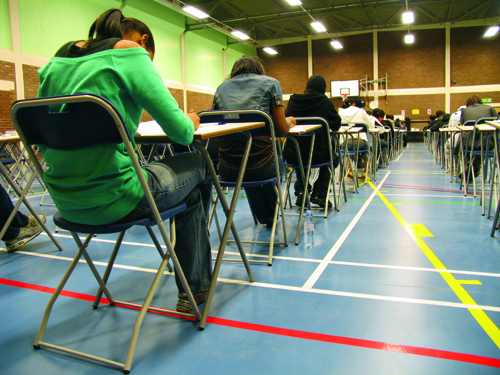

<p><img class=" alignright size-full wp-image-94" style="margin: 5px; float: right;" src="http://schoolnewsnz.fastrackdev.com/wp-content/uploads/2011/10/SN11_-_News_-_Principal_Speaks_-_414585.jpg" alt="SN11 - News - Principal Speaks - 414585" width="253" height="190" />For most young Kiwis, ICT is an integral part of life: texting, messaging, online gaming, chat rooms, blogging, podcasting and YouTube are essential</p>
<p> <!--more--> </p>
<p>tools of communication and information seeking. Students, as well as adults, can access information – anywhere, anytime.</p>
<p>These skills have now moved into the classroom. Transferable generic skills such as problem solving, communication skills, analysing information and the ability to use and adapt to new technology are essential today.</p>
<p>Learn-that knowledge soaked up by sponge-like students is no longer sufficient.</p>
<p>Robert K Branson, one of my pedagogical gurus, asserts that schools&#8217; book-based technology has reached the upper limit of effectiveness and, no matter how much more money is poured into schools, nothing will really improve.</p>
<p>Since about 2004, Branson argues, there have been enough computers and internet access to permit schools to shift into this &#8216;second paradigm&#8217;. In fact it is imperative that they do.</p>
<p>This second paradigm, the Secondary Futures findings, and current New Zealand Curriculum are all stimulating change in secondary schools. Most people agree one size does not fit all, that delivering the curriculum should become student-centred learning, that teachers should develop relationships with kids, and that we need to produce confident, actively engaged, lifelong learners if education is to transform New Zealand into a knowledge-based economy.</p>
<p>Most staff in our school believe student-centred learning, where students reflect on and actively contribute to their own learning, is the way to go. However, the teacher is still deciding what is taught, how, and why.</p>
<p>The &#8216;why&#8217; is because the student will need it for NCEA.</p>
<p>When NCEA started in 2003 it seemed that student-centred learning might be possible. The hierarchy of subjects was reduced and courses broadened.</p>
<p>All students could experience success, thanks to unit standards, internal assessment and carefully crafted courses with appropriate learning <a class="wpil_keyword_link" href="https://www.schoolnews.co.nz/2015/10/developing-opportunities-at-school-with-a-view/" title="opportunities" data-wpil-keyword-link="linked" target="_blank">opportunities</a>.</p>
<p>For a short time teachers were trusted enough to run courses with only internal assessment. Everyone would be recognised for their achievement. The old screening and sorting function of schools was going.</p>
<p>However, screening and sorting is reasserting itself. Under the guise of motivating students, we now have certificate endorsements, course endorsements will be introduced next year, then new unit standards with excellence and merit levels will be brought in.</p>
<p>Universities are ranking their applicants and giving priority to those with merit and excellence, inventing their own grade point averages.</p>
<p>Currently, the standards are being aligned. Unit standards with similar achievement standards are being culled. Unit standards tested skills but needed less reading and writing, so were more accessible for students with different skills and abilities, so it is sad to see them go.</p>
<p>Numeracy and literacy skills are being lowered to levels 3 and 4 of the curriculum and must be achieved within an appropriate context, a cross-curriculum approach. How wonderful, but why not such an approach for all senior students?</p>
<p>A new International Tertiary Admission Ranking (ITAR) system will mean that students who achieve NCEA Level 3 can link to overseas qualifications and ease entry to these universities. I think the current pathways already work well.</p>
<p>Soon all people will be concerned about is this ITAR score, like the B bursary of earlier years. Those not achieving it will be labelled failures.</p>
<p>But whose interests are we serving? I suspect it is the interests of universities and the government.</p>
<p>Universities want to control their intake, restrict numbers of domestic students to the number actually funded by the government and weed out the students unlikely to enhance their reputation. Universities dominate education, but attract fewer than 25 per cent of school leavers. Government wants to get a grip on student loans.</p>
<p>All this seems at odds with the governments desire to produce life-long learners and a knowledge economy. Despite a world-beating new curriculum with enormous possibilities, I don&#8217;t think it is likely we will see student-centred learning in many secondary schools.</p>
<p>We may see inclusive schools like ours who try to develop the approach in Years 9 and 10, or a few new schools which can start with a new philosophy and approach, but most will continue to create kids who can and those that can&#8217;t.</p>
<p>I want a school which produces creative, confident, connected, involved, lifelong learners. Why return to old-fashioned teaching for the test?</p>

Te Akatea Inc., the National Māori Principals’ Association has released a discussion paper reflecting on…
AI could help support attendance strategies with data analysis and more for schools looking to…
Stuffy, poorly ventilated spaces can lead to reduced concentration, reasoning, and memory performance, writes Dr…
Fitness has been made fun and accessible following a student-led push for outdoor gym equipment…
A central Auckland preschool has teamed up with a street artist to create an interior…
Since 2015, fewer students are completing secondary school, defined as remaining enrolled in education until…
This website uses cookies.